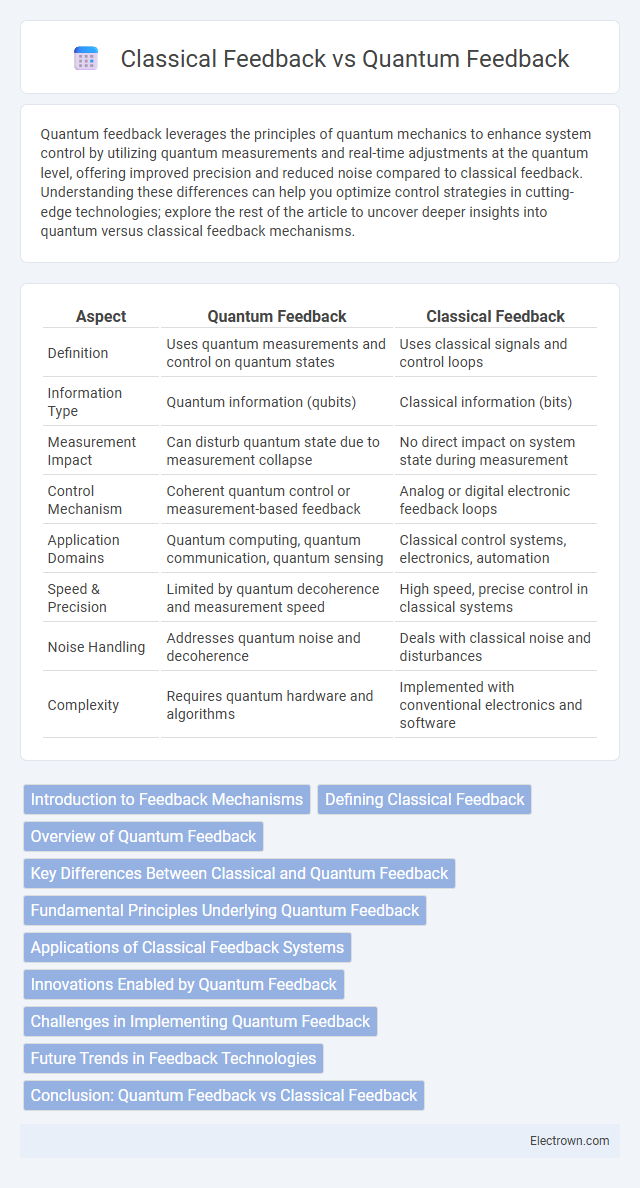Quantum feedback leverages the principles of quantum mechanics to enhance system control by utilizing quantum measurements and real-time adjustments at the quantum level, offering improved precision and reduced noise compared to classical feedback. Understanding these differences can help you optimize control strategies in cutting-edge technologies; explore the rest of the article to uncover deeper insights into quantum versus classical feedback mechanisms.
Table of Comparison
| Aspect | Quantum Feedback | Classical Feedback |
|---|---|---|
| Definition | Uses quantum measurements and control on quantum states | Uses classical signals and control loops |
| Information Type | Quantum information (qubits) | Classical information (bits) |
| Measurement Impact | Can disturb quantum state due to measurement collapse | No direct impact on system state during measurement |
| Control Mechanism | Coherent quantum control or measurement-based feedback | Analog or digital electronic feedback loops |
| Application Domains | Quantum computing, quantum communication, quantum sensing | Classical control systems, electronics, automation |
| Speed & Precision | Limited by quantum decoherence and measurement speed | High speed, precise control in classical systems |
| Noise Handling | Addresses quantum noise and decoherence | Deals with classical noise and disturbances |
| Complexity | Requires quantum hardware and algorithms | Implemented with conventional electronics and software |
Introduction to Feedback Mechanisms
Feedback mechanisms regulate system behavior by continuously adjusting outputs based on input signals; quantum feedback leverages quantum measurement and control to maintain coherence and entanglement, essential for quantum computing and communication. Classical feedback relies on deterministic signals and macroscopic variables, whereas quantum feedback operates on probabilistic quantum states and wavefunction collapse. Your understanding of these distinctions is crucial for advancing technologies that exploit quantum information processing and control.
Defining Classical Feedback
Classical feedback involves the continuous measurement of a system's output, which is then processed and used to adjust inputs in a deterministic manner, maintaining system stability and performance. This feedback operates under the principles of classical physics, where information can be copied and observed without altering the system's state. Your control mechanisms rely on this predictable, noise-immune approach to ensure precise regulation in traditional engineering systems.
Overview of Quantum Feedback
Quantum feedback uses measurements on quantum systems to dynamically adjust their behavior, leveraging quantum coherence and entanglement for enhanced control precision beyond classical limits. Unlike classical feedback, which relies on macroscopic measurements and deterministic signals, quantum feedback processes information within the quantum state, enabling real-time error correction and noise suppression in quantum computing and communication. Your ability to stabilize fragile quantum states depends critically on implementing quantum feedback protocols that maintain coherence while adapting system dynamics.
Key Differences Between Classical and Quantum Feedback
Classical feedback relies on continuous measurement and deterministic control to stabilize systems, while quantum feedback operates using weak measurements and quantum state estimation to preserve coherence. Quantum feedback can counteract decoherence in quantum states by exploiting entanglement and superposition, which classical feedback cannot achieve due to measurement collapse. Your ability to harness quantum feedback enables advanced control in quantum computing and communication, offering precision beyond classical limits.
Fundamental Principles Underlying Quantum Feedback
Quantum feedback leverages the principles of superposition and entanglement to dynamically adjust a quantum system's state based on real-time measurement outcomes, unlike classical feedback which relies solely on observed macroscopic variables. Measurement in quantum feedback inherently disturbs the system, requiring sophisticated strategies such as weak measurements and quantum non-demolition techniques to preserve coherence while extracting information. These fundamental principles enable improved control over quantum errors, stabilization of fragile quantum states, and enhancement of quantum computing and communication protocols.
Applications of Classical Feedback Systems
Classical feedback systems are widely used in engineering applications such as temperature control, automotive cruise control, and industrial automation, where maintaining desired output despite disturbances is crucial. These systems rely on continuously measuring outputs and adjusting inputs to minimize error, ensuring stability and precision in mechanical and electrical devices. You can leverage classical feedback for robust real-time control in processes where quantum effects are negligible or unnecessary.
Innovations Enabled by Quantum Feedback
Quantum feedback enables unprecedented control of quantum systems by utilizing real-time measurement and adaptive manipulation, which enhances quantum error correction and stabilizes fragile quantum states. Unlike classical feedback, which processes signals in a deterministic manner, quantum feedback leverages the principles of superposition and entanglement to optimize system performance and improve coherence times. Innovations such as autonomous quantum error correction, enhanced quantum metrology, and quantum-enhanced sensing have been realized through these advanced feedback mechanisms.
Challenges in Implementing Quantum Feedback
Implementing quantum feedback faces challenges including maintaining coherence in quantum states amid noise and decoherence, which classical feedback systems do not encounter to the same extent. Precise real-time measurement and control are required to update quantum states without causing collapse, demanding advanced quantum sensors and fast processing units. Scaling these systems for practical quantum computing applications remains difficult due to hardware limitations and error correction requirements.
Future Trends in Feedback Technologies
Quantum feedback systems leverage principles of quantum measurement and entanglement to enable ultra-precise control in quantum computing and communication, showing transformative potential for future technological advancements. Classical feedback mechanisms remain essential for conventional electronics and control systems, but the integration of quantum feedback could drive innovations in error correction and real-time adaptive control at unprecedented scales. Emerging hybrid approaches combining quantum and classical feedback aim to optimize system performance by harnessing quantum advantages while maintaining classical stability and scalability.
Conclusion: Quantum Feedback vs Classical Feedback
Quantum feedback leverages quantum coherence and entanglement to achieve faster, more precise control of quantum systems compared to classical feedback, which relies on measurement outcomes subject to classical noise and delays. The intrinsic ability of quantum feedback to operate in real-time without destroying quantum states enhances performance in quantum error correction and stabilization. Classical feedback remains effective for macroscopic systems, but quantum feedback is essential for advancing quantum computing and communication technologies.
quantum feedback vs classical feedback Infographic

 electrown.com
electrown.com